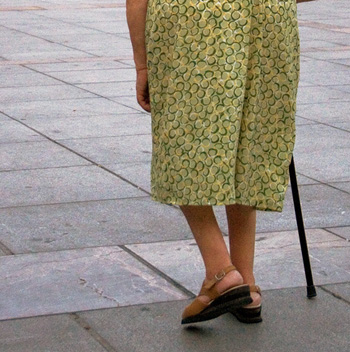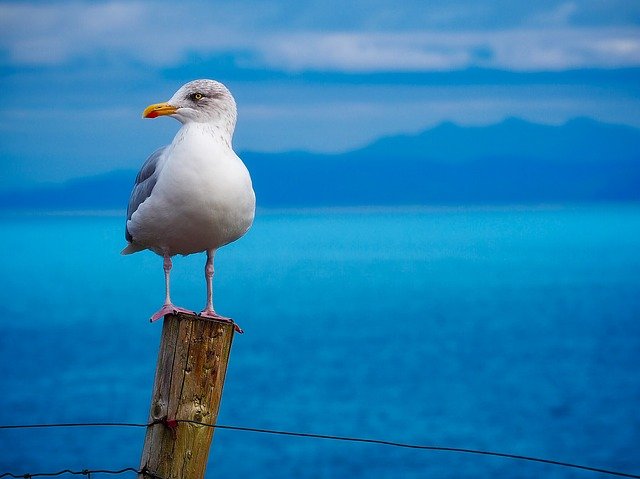You have no items in your cart. Want to get some nice things?
Go shopping
Of course it wasn’t just Holland. Granny Oudewater knew better than that. She’d encounter them anywhere. Those sideways glances. The offhand remarks. They’d do it in any country. Probably.
[private]Then again, she lived here. It happened here. Here, they bumped into her at the supermarket, when she was blocking yet another aisle, immune to the unholy hurry that seemed to posses anyone else. Here, they casually cut in line. And here people thought of her singularity, her not fitting in, as something close to a criminal offence.
That morning another letter of complaint had arrived, standing out amidst the endless stream of brochures and leaflets for toys. As always, it focused on her inability to take care of herself. On the smell, that apparently bothered her neighbours. Granny shrugged and buried the letter in the leftover papers meant to serve as kitty litter. Despite their sensitive nasal faculties, she was sure that when she died the neighbours would only discover it after weeks, if not months. That much they cared. Plus, as far as she was concerned, people with such a horrible taste in music weren’t allowed any complaints. At all. Just then, another one of them cranked up the volume. Within minutes, the numerous pictures framed on her walls would be trembling to the all-devouring bass.
Unfortunately, this time, she would have to deal with them, now that they threatened to get a social worker involved. She knew how that would go. The woman would take a quick look around and still manage to produce a voluminous report. She’d give special attention not only to Granny’s collection of aquariums, without fish these days, but serving as large drinking bowls for Ottawa, her cat, but also to the frames, especially to the default images of happy families and playing kids still in it. She’d look Granny up and down and would end up putting her away as some freak, better off in a retirement home, where she could be supervised. Well, Granny Oudewater wasn’t going to give up without a fight.
The city of Bergen op Zoom lay quiet when Granny ventured out, dressed warm and well against the outside world. For a moment, the brightness caught her off guard, but soon she steeled herself against the vastness of the open air. Carefully, steadying herself against walls, lantern posts and whatever else came along, she shuffled on. She had forgotten the pleasure of feeling light, real daylight, on the skin and sure enough, a smile broke through. In the distance, clear voices sounded, children in the throes of games. As she remembered, she had always been fond of children. The ones in the pictures, at least.
They were playing. A group of five, six boys ran around in an old playground, attacking the see-saw and the slide at will. She settled down on a nearby bench, against the backdrop of their little world. It was hard to tell anything from them. They were children, coming together and falling apart at a moment’s notice, both serious and unconcerned, running this way and that. One of them was a little black boy. He climbed and pushed and yelled as much as the rest of them, going unnoticed between them. For now, Granny knew. Different didn’t last in Holland.
A sudden wind tore open the sky and the children finally took notice of her. ‘What are you looking at, schele!’ one of them yelled. He called the other boys to attention. ‘Look at her! What a freak!’ They gathered around, a small band of hostility. ‘Brillenjood! Brillenjood!’ they jeered, pointing at her thick glasses. ‘That’s an awful thing to say!’ Granny tried, while the kids danced around her in an attempt to drag her off her bench. ‘Shut up, old fart!’ the leader said. ‘Ugh, she smells funny,’ another one called out. ‘Like garbage!’ The leader stepped in, taking on an experienced face. ‘No, she’s that lady my mum talks about. The one that reeks of fish!’ ‘Eeeww!’ the others chimed. ‘Go away!’ the boy commanded. Granny Oudewater sighed and got up slowly. So it came down to this.
The rest of her walk took quite a while and when she finally reached the water, the sky had turned an autumnal Dutch blue. If it weren’t for a few persistent tufts of grass, sky and river, when you looked a certain way, were one, joined in a magnificent grey.
She remembered this place well. A lifetime ago, she had spent many a happy hour here with a certain Canadian sailor. Of course, back then she still belonged. But other than that, little had changed. Cormorants still hunched over the water; lovers still hid in the reeds.
Little did she know back then that what happened here, by the water, would happen always as her mind kept groping back to those last days of summer. Come fall, the Canadian had had to leave and they, her parents, wouldn’t let her go with him. She’d pondered escapes, revenge, but in the end, like the rest of her life, it had come to nothing. There had been suitors, but no proposals. Jobs, not a career. A house, but never a home. A fish out of water, his leaving had quenched the life right out of her. So it was only right to return here. She had, in fact, never left.
It was also the only place where no one bothered with her. If people came by at all, they saw an old lady on a bench by the waterside, contemplating things past, and they wouldn’t give her a second thought. They’d pass quickly, with their troubles and noise, their rudeness and opinions. The churches of Bergen op Zoom were only shapes against the edge of the world. Other than that, she was alone. The way she liked it.
The wind rose and so did Granny Oudewater. She looked out over the river. In the distance, a last boat moored. They predicted evil weather. She edged towards the water, the wind tugging at her clothes as if it meant to push her back. But Granny, used to a lifetime of opposition, thought nothing of it. She took the pins out of her hair and, an offering, held them up for the wind to swipe away. She shook her hair. It was a long time since she had loosened it and it reached down almost to her waist. She had been beautiful once.
Next up, the glasses. Those she didn’t need either. She hesitated a bit over her wallet, not because of the money, but because of the pictures in it. Even if it were default, she had grown to care for her little model sons and daughters, come to think of them as, well, family. In the end, she took out the only real picture: Ottawa’s colourful bulk, asleep on a stack of fresh laundry, without a care in the world.
Time faded. The shore retreated and still she waded further and further, until there was no more ground, only grey. The water was cold, but not as much as she’d expected. Ages ago, in her Canadian days, it had been cool and soothing and even if it was already the first of November now, it was still a bit like that, nice and forthcoming.
She remembered skinny-dipping, making love in the heat of summer. His arms were strong, strong and muscular, and he smelled of sea. He could hold her so tightly it took her breath. And he would whisper to her, words she didn’t understand, words perhaps that made no sense at all.
It tugged, the water. Like coming home.
Up in the distance, a bell tower chimed. Her lips moved, like in prayer, as she went in deeper and deeper. All around her, the waters rose and swelled.
Glossary
Schele – Dutch name calling, meaning ‘someone who squints’.
Brillejood – Dutch name calling, used by children mainly, for someone who wears glasses.
Lekker – Dutch word for tasty[/private]

Milla van der Have wrote her first poem at 16, during a physics class. She has been writing ever since. Milla lives and works in Utrecht, the Netherlands. Milla's work has been published in Loch Raven Review, The Wilderness House Literary Review, Midwest Literary Magazine, Halfway Down the Stairs, Full of Crow Quarterly, and Dr. Hurley's Snake-Oil Cure. See millavanderhave.blogspot.com.





